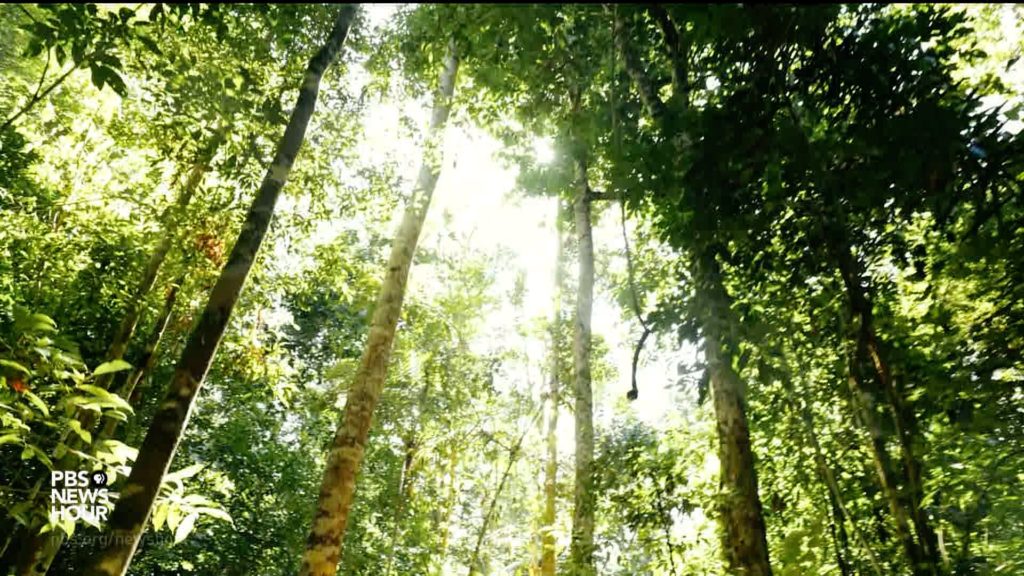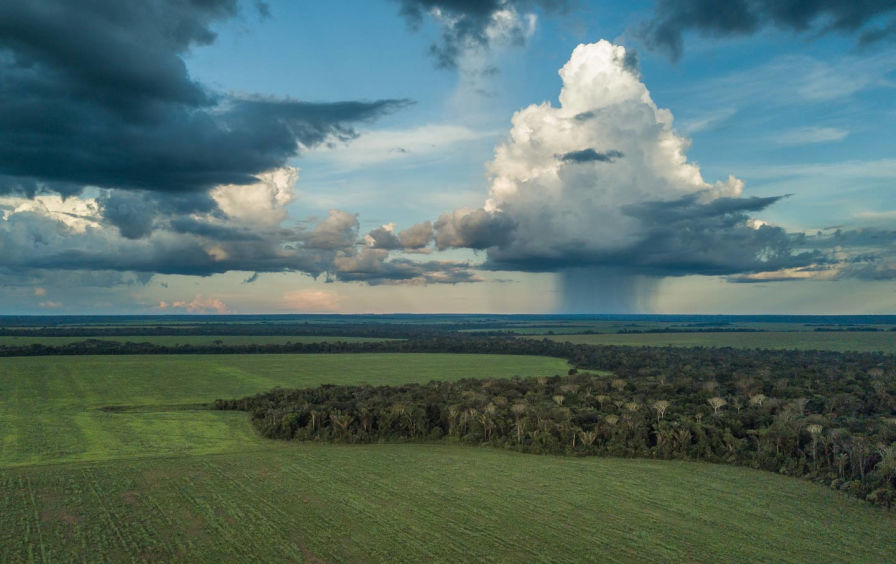
Read the Full Transcript
Judy Woodruff:
This Sunday, Brazilians go to the polls to elect a new president. Hanging in the balance is not only the political future of Latin America's biggest country, but also the future of one of the planet's most vital tools for fighting climate change, the Amazon rain forest, often called the lungs of the planet.
Tonight, with the support of the Pulitzer Center, and in collaboration with "The Nation" magazine and PRI's "The World," special correspondent Sam Eaton brings us the second part of his look at what that future might hold.
Sam Eaton:
Brazilian soy farmers Jaime Farinon knows who he is voting on Sunday.
Jaime Farinon (through translator):
Maybe we will manage to get a Trump here to set this country straight.
Sam Eaton:
He's referring to presidential candidate Jair Bolsonaro, a right-wing populist leading in the polls who's often referred to as Brazil's Donald Trump.
Bolsonaro, known for his divisive attacks on women, blacks, homosexuals, and indigenous communities, became the victim of the same violence he promises to be tough on when he was stabbed at a campaign rally on September 6.
The event was captured on cell phones. His popularity has since soared.
Jaime Farinon (through translator):
In these parts, you have to have a little blood in your veins.
Sam Eaton:
But it's Bolsonaro's promise to withdraw from the Paris climate agreement and his political alignment with the powerful congressional agribusiness lobby called the "ruralistas" that has farmers like Farinon and Ilson Redivo excited about their candidate.
Their soybean farms are close to 10,000 acres each, located on the southern edge of the Amazon rain forest in Brazil's third largest state, Mato Grosso.
America's trade war with China has caused global demand and prices for Brazilian soy to surge. The temptation to clear more Amazon rain forest to meet that demand is huge. And soy farmers like Farinon and Redivo want a government that's not going to stand in the way.
Ilson Redivo (through translator): I think this environmentalist movement wants to break the development in Brazil. Where we have soil, like here, highly productive, it has to be exploited.
Sam Eaton:
Not far from the soy fields, Raimundo Maniwari and other members of the Munduruku tribe take motorbikes deep into their 400-square mile forest reserve to harvest Brazil nuts.
Raimundo Maniwari (through translator): Since I was a child, my father harvest the Brazil nuts, and we would tag along. Back then, we learned how to work with the Brazil nuts.
We would gather more selectively just to eat. We would pick only the big ones for ourselves.
Sam Eaton:
Maniwari says since then farms have surrounded the Mundurukus' forest on all sides, clearing the trees right up to the edge. Things haven't been the same since.
Jaime Farinon (through translator):
The river, the wind, the weather, it's all different now. In the past, what we called summer used to come earlier. And, today, the wind is hot and dry. It doesn't bring the calmness that it used to.
Sam Eaton:
He says, a few years ago, the Brazil nut trees didn't produce any nuts at all for the first time.
These changes are worrying scientists who say deforestation combined with rising temperatures and the droughts and fires they encourage is taking a heavy toll on the forest.
Carlos Nobre is Brazil's leading climatologist.
Carlos Nobre:
The Amazon, until recently, was a very potent carbon sink. It was actually extracting from the atmosphere over something between two and three billion pounds of carbon dioxide. That sink is declining over time.
Sam Eaton:
Nobre says total deforestation in the Amazon is only a few percentage points shy of triggering an ecological tipping point that could cause more than half of the Amazon forest to die off, an event, he says, that would release so much carbon into the atmosphere, that it would send global warming into hyperdrive.
But as the world's demand for meat and the soybeans used in animal feed only grows, Nobre says, if nothing changes, reaching that tipping point is just a matter of time.
The Amazon Basin has been locked in this fierce battle between conservation and indigenous rights on one side and the extraction-based economy on the other. It's basically a losing game, which is why many are asking, is there a third way for the Amazon, one that values a forest left standing like this one as a global public good? And how do you create economic potential, so that the people living within the forest see this as much more valuable than clearing the land?
At the Mundurukus' village, the chief rings a bell to announce a meeting. The occasion is the arrival of agronomist Paulo Nunes. His donor funded program called Sentinels of the Forest has enabled indigenous groups like the Munduruku to turn the Brazil nuts that grow wild in the forest into a badly needed cash crop.
Paulo Nunes (through translator): If we want to save the Amazon forest, we need to invest in this kind of value chain, to add value to the products, to value the work of the traditional communities, of the people that have been helping to keep this forest standing for millennia.
Sam Eaton:
Brazil's banking system still prefers to invest its money in cattle ranches and soy farms, but Nunes says making even some of that capital available to enterprises like this that leave the forest standing would pay much greater dividends over the long term, helping the Munduruku like Maniwari protect their forest and the global climate for millennia to come.
Raimundo Maniwari (through translator): So this little bit of forest we are preserving, it's our insurance for the future.
Sam Eaton:
But Nunes says that's only half the battle. To really protect the forest against the enormous economic pressures aimed at tearing it down, he says you have to create an entirely new value chain from scratch.
That's why Nunes partnered with a small farmer cooperative called COOPAVAM to build this state-of-the-art Brazil nut factory near the Munduruku forest. It's like a proof concept. He says, by processing the Brazil nuts in the factory, the value increases by a factor of 20, money that stays right here in the Amazon.
Luzirene Lustosa is the cooperative's president.
Luzirene Lustosa (through translator): In the beginning, we didn't realize that the Brazil nuts would work out. The price was really low. It had no value, and we didn't have a market. But a small group believed that it could work.
Sam Eaton:
The cooperative, now run almost entirely by women, processes and sells refined Brazil nut oil to the eco-friendly cosmetic giant Natura. It also supplies nuts to more than 42,000 children for school meals, among other contracts.
And for local women like, Ana Maria Medina, it's providing valuable employment. COOPAVAM not only buys Brazil nuts from indigenous lands like the Mundurukus'. They also buy from the cooperative's own 20,000-acre forest reserve.
Agrarian settlements in the Amazon like this one come with the mandate that only 20 percent of the forest can be cleared for farming, a law that's more often broken than followed. And Lustosa says it would have been the same here.
Luzirene Lustosa (through translator): In the beginning, people didn't accept that. They would say, why would we want a reserve? We need that land for farming. There was even talk about digging up the reserve so people could deforest, because our individual plots were so small.
We didn't know that if we kept it standing, we would have what we have today.
Sam Eaton:
Now Lustosa says everyone's talking about planting more trees.
Paulo Nunes says, through this project, farmers and indigenous people in the Amazon are now working together to save the rain forest and to create sustainable livelihoods. The potential, he says, is enormous. They just need everyone else to get on board.
Paulo Nunes (through translator): What we're doing is to prove that this is viable, so that the government and the financial institutions can see that it works, that it's worth investing in, because the economics are sound. We believe that, over time, it will be possible to bring about this transformation, this change.
Sam Eaton:
Nunes says Brazil's future, and the world's, hangs in the balance.
For the "PBS NewsHour," I'm Sam Eaton, Mato Grosso, Brazil.





